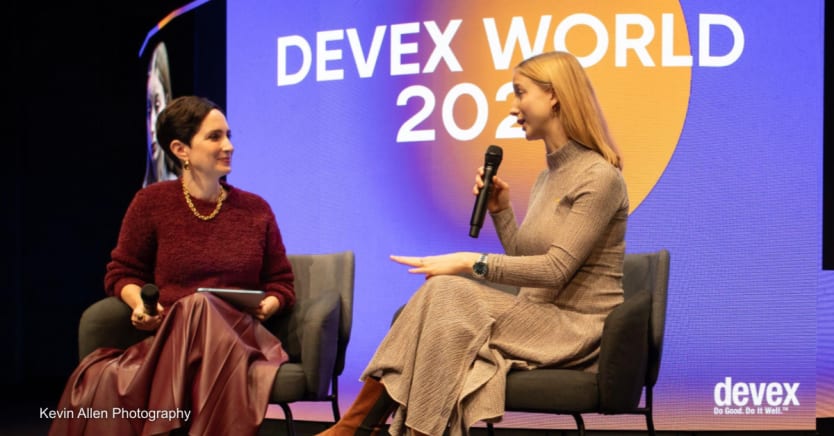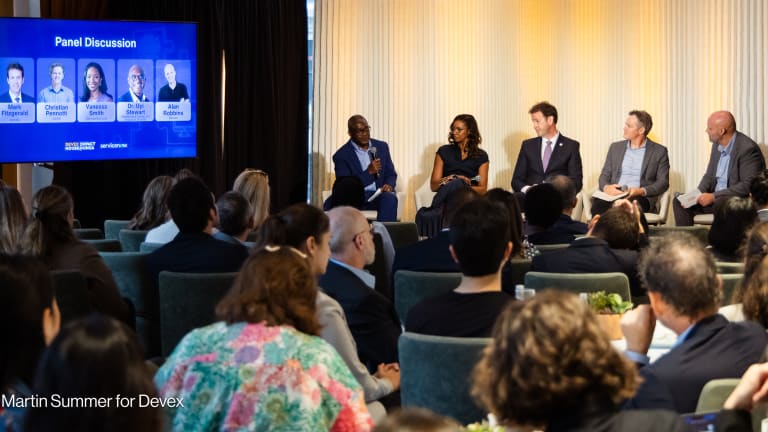
As digital transformation reshapes economies worldwide, agriculture remains one of the most crucial yet underserved sectors in low- and middle-income countries. “The majority of rural communities still don't have affordable and consistent connectivity,” said Stephanie Smith, senior vice president for Community Pass at Mastercard, during the session Accelerating Africa's transformation through digitization of the agricultural ecosystem at Devex World in October. “They're offline, and about a third of individuals in these communities don't have a form of identification, let alone a digital record of their identity. So [they’re] invisible to service providers, to banks, sometimes even to governments,” she said.
In response, Mastercard’s Community Pass brings agri-sector stakeholders together in a centralized digital platform that provides transparency, visibility to fair pricing, and direct access to buyers. By enabling farmers to set competitive prices based on real-time market data, Community Pass helps to level the playing field.
“Agriculture is the number one employer in low-income communities, so there's tens, hundreds of millions of farmers out there who need to get access to digital platforms. That's why we built … Community Pass, which is all about connecting,” Smith said.
In the conversation with Devex Executive Vice President and Executive Editor Kate Warren, Smith highlighted Mastercard’s and the Community Pass platform’s impact on financial inclusion and support for smallholder farmers in Africa, the barriers that persist, and how partnerships are paving the way forward.
Meaningful digital transformation is key
Despite its promise, bringing digital inclusion to agriculture presents significant challenges. Many low-income regions lack the necessary infrastructure, such as consistent internet connectivity or basic identification systems. For digital transformation to have a sustainable impact, it needs to go beyond internet access and connect individuals to critical services such as banking, loans, and marketplaces, Smith emphasized. This issue affects farmers such as Christina, a coffee grower in Uganda.
“Christina struggles to know, what is the market price for her own crop? So, when the one trader who visits her village comes to her farm gate, she has to accept whatever price she is told. She has no way of knowing, is this a good price? Is this a fair price?” Smith said.
Community Pass helps address these issues by providing farmers with digital credentials and profiles, granting them a formal presence in the digital economy. To date, Community Pass has connected over 6 million farmers, primarily in East Africa and India, to wider networks of buyers and sellers, Smith said. These digital identities help facilitate transactions and foster trust with service providers, banks, and cooperative agents — a crucial component for the long-term success of digital solutions. “When [financial inclusion meets] digital inclusion, that's economic opportunity,” she said.
Collaboration for success
Overcoming structural and technological barriers requires extensive collaboration, Smith said. “Just in agriculture, as an example, you've got to get the farmer access to connectivity, to a device, to digital skilling. Then you've got to connect her to a bank, to an insurance provider, to a buyer, to an agri-dealer — the list goes on,” Smith explained. “That's where a company with a scale like Mastercard can come in and actually organize all of those participants.”
In May this year, Mastercard joined forces with the African Development Bank to launch the Mobilizing Access to the Digital Economy, or MADE Alliance: Africa. Over the next 10 years, the coalition aims to connect 100 million businesses and individuals in Africa to critical services through digital tools.
One example of this collaboration in action is in Kenya, where Mastercard worked alongside Microsoft, which, in turn, worked with a local internet service provider and the Kenya National Farmers Federation to provide cooperative members with connectivity and digital training. Through Community Pass, farmers in these cooperatives can now access buyers, secure fair prices, and purchase agricultural inputs directly. The project illustrates the value of multi-stakeholder collaboration in breaking down complex barriers, Smith noted.
Scaling impact
Looking ahead, among the goals of Mastercard’s Community Pass is operationalizing the MADE Alliance: Africa. As part of that, Mastercard aims to register 15 million users in Africa onto its Community Pass platform within five years, with the eventual aim of connecting 100 million people to digital services over the next decade through the MADE Alliance. Achieving this scale means embedding security and privacy at every level, Smith emphasized. “That's where a technology company like Mastercard can really lend its expertise and its wisdom in partnership, not in competition, with governments and with other institutions.”
Beyond agriculture, Community Pass can be extended to health care, education, and other sectors. “How do you give that same farmer using Community Pass not only for agricultural and financial services she needs, but also to access health care or educational resources for her family?” Smith said.
To support Mastercard’s goal, Smith came back to the topic of collaboration and how each partner plays a role tied to their core competency. “I think [we] are really well set up to solve this challenge, but we need the right partners around the table with us to do this,” she said.








